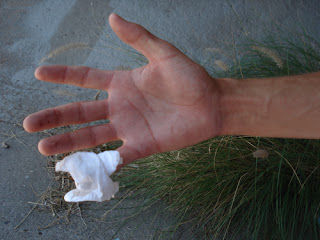>
Boyce Lundstrom – one of the co-founders of the Bullseye Glass company and fused glass leader – answers questions about vexing glass fusing issues on his website. Recently he posted on other ways to detect the tin side of float glass. As glass fusers know, the tin side of float is contaminated with tin during the float glass making process, and locating the tin side is useful for the artisan.
Boyce writes:
“The most accepted way to tell which side was floating on the tin is to use a short wave black light. A small device often referred to as a Tin Scope is available and costs approximately $55. When the black light is placed against the glass, the tin side will appear cloudy. (Mark that side with a permanent marker.)”
| M L Duffy checks for tin side as he creates the cast glass for Safeway supermaket’s Bethesda public artwork. |
“Another way to test is with cutting and firing. First mark one side of your glass with a line made with a permanent marker. Cut off a strip of the glass that has the marker line and fire the strip to 1450º. The tin side will not devit or haze. The side without the tin will haze, or get a satin finish. Match up your tests and mark the larger glass as to the tin side for later identification. The cost will be about $.50 for the firing in any 120 volt kiln.”
 |
| “This feels like float…” |
Boyce continued – “I recently tried a third method of discerning the tin side of Float glass with my students at a workshop in Kansas City. I explained how Float glass was made, and then I asked them to identify the tin side by using only the sense of touch. They were encouraged to feel the two previously cleaned sides of the Float glass with their fingers and discern a slight difference in the surface texture. Without further instruction or explanation, every one of the students was able to tell me which side of their glass sample had the tin finish. One side was smooth but the other side is “smoother.” The less smooth side is the tin side. The cost is “0.” Trust yourself!”
Interesting premise – I have not tried it yet. I am sure that I will feel the cut side of the float glass.
 |
| Ow. |
Click HERE to jump to Boyce Lundstrom’s Q & A section of his website.